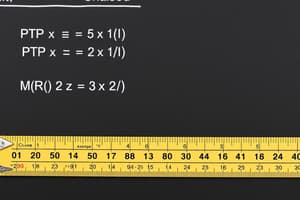Podcast
Questions and Answers
What is the importance of unit conversions in various fields?
What is the importance of unit conversions in various fields?
- To enable comparison and calculation of quantities with different units (correct)
- To avoid using calculators
- To only work with metric units
- To only work with imperial units
What type of unit conversion is meter to centimeter?
What type of unit conversion is meter to centimeter?
- Temperature conversion
- Mass conversion
- Length conversion (correct)
- Time conversion
Which of the following is an example of a temperature conversion?
Which of the following is an example of a temperature conversion?
- Celsius to Fahrenheit (correct)
- Meter to centimeter
- Liter to milliliter
- Gram to kilogram
What is an example of a volume conversion?
What is an example of a volume conversion?
How many types of unit conversions are mentioned in the text?
How many types of unit conversions are mentioned in the text?
Flashcards are hidden until you start studying
Study Notes
Unit Conversions
Importance of Unit Conversions
- Essential in various fields such as science, engineering, and economics
- Enables comparison and calculation of quantities with different units
- Avoids errors and inconsistencies in measurements and calculations
Types of Unit Conversions
- Length conversions
- Meter (m) to centimeter (cm), millimeter (mm), kilometer (km), etc.
- Inch (in) to foot (ft), yard (yd), mile (mi), etc.
- Mass conversions
- Gram (g) to kilogram (kg), milligram (mg), tonne, etc.
- Pound (lb) to ounce (oz), ton, etc.
- Time conversions
- Second (s) to minute (min), hour (h), day, etc.
- Temperature conversions
- Celsius (°C) to Fahrenheit (°F), Kelvin (K)
- Volume conversions
- Liter (L) to milliliter (mL), cubic meter (m³), etc.
- Fluid ounce (fl oz) to cup, pint, gallon, etc.
Conversion Factors
- Length
- 1 m = 100 cm = 1000 mm
- 1 in = 2.54 cm
- Mass
- 1 kg = 1000 g
- 1 lb = 0.45 kg
- Time
- 1 min = 60 s
- 1 h = 60 min
- Temperature
- °C to °F: °F = (°C × 9/5) + 32
- °F to °C: °C = (°F - 32) × 5/9
- Volume
- 1 L = 1000 mL
- 1 fl oz = 29.6 mL
Conversion Techniques
- Multiplication and Division
- Multiply or divide by a conversion factor to convert between units
- Unit Cancellation
- Cancel out units by multiplying or dividing by a conversion factor
- Dimensional Analysis
- Convert between units by setting up a series of conversion factors
Practice and Applications
- Practice converting between units in different contexts
- Apply unit conversions to real-world problems in science, engineering, and economics
Studying That Suits You
Use AI to generate personalized quizzes and flashcards to suit your learning preferences.




